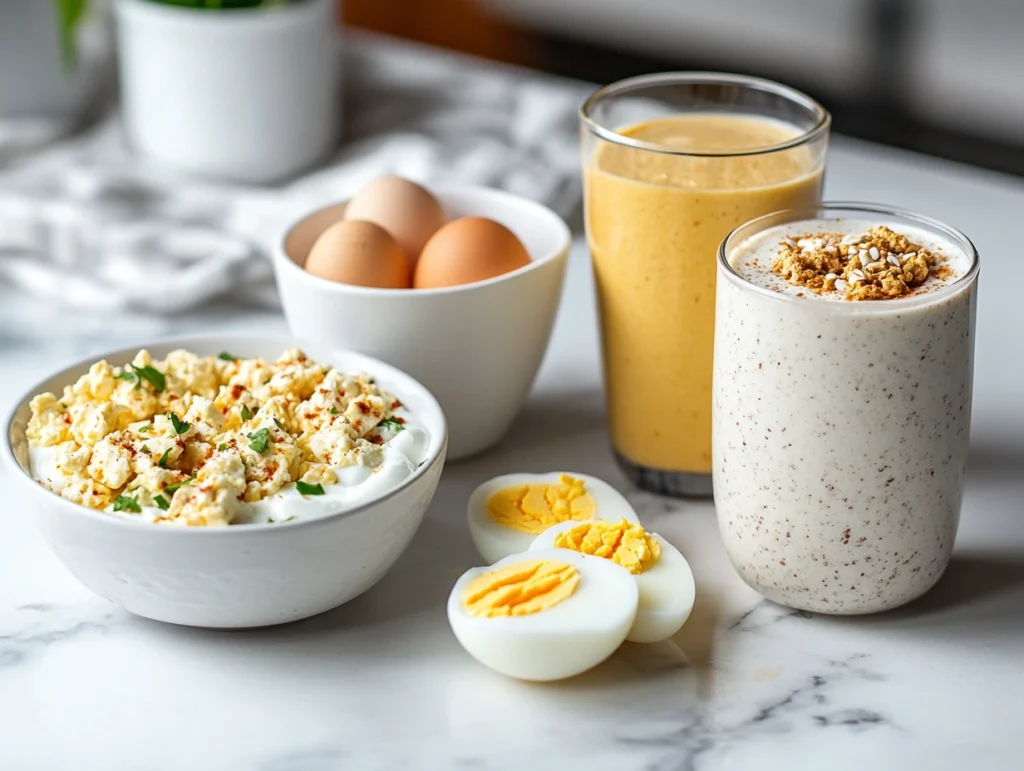Starting your day with 30 grams of protein at breakfast can seem like a lot, but is it too much? This question sparks plenty of debate among nutrition enthusiasts and health-conscious individuals. Protein plays a vital role in muscle repair, energy levels, and keeping hunger at bay, but understanding how much your body actually needs in the morning is key. In this article, we’ll explore whether 30 grams of protein is appropriate for breakfast, who benefits most, and how to incorporate it effectively into your diet.
Understanding Protein in Breakfast Nutrition
The Role of Protein in a Healthy Breakfast
Protein is the foundation of a nutritious breakfast. It not only helps repair muscles after a night’s rest but also fuels the body for the day ahead. Compared to carbs and fats, protein takes longer to digest, keeping you full longer and reducing those pesky mid-morning cravings. This is why high-protein meals are often associated with weight management and increased focus throughout the day.
How Much Protein Do You Actually Need?
The amount of protein you need depends on several factors, such as your age, weight, and activity level. For most people, a healthy range is between 15–30 grams per meal. Aiming for the higher end, especially in the morning, can kickstart your metabolism and provide energy for busy mornings.
However, what works for one person might not work for another. Sedentary individuals may not require as much as athletes or people with physically demanding jobs.
How Protein Affects the Body at Breakfast
When you eat protein in the morning, it triggers the release of hormones like peptide YY and GLP-1, which promote satiety and regulate blood sugar levels. This means a high-protein breakfast not only curbs hunger but also prevents energy crashes later in the day.
For example, pairing eggs with toast offers both protein and carbs, creating a balanced meal that keeps you going for hours.
The Science of Protein Timing
Protein timing isn’t just a buzzword—it’s rooted in how your body processes nutrients. After fasting overnight, your muscles are primed to absorb protein, making breakfast the ideal time to consume a hearty dose. Spreading protein intake evenly across meals is also more effective for muscle health than cramming it all into one meal.
Common Myths About Eating Too Much Protein
It’s a common misconception that eating too much protein can strain your kidneys or cause weight gain. For healthy individuals, consuming 30 grams of protein at breakfast is safe and beneficial. In fact, studies show that higher protein intake can improve metabolism and overall health.
Is 30 Grams of Protein Too Much for Breakfast?
What Does 30 Grams of Protein Look Like?
Hitting 30 grams of protein at breakfast might sound overwhelming, but it’s easier than you think. Here’s how common breakfast foods add up:
- Three large eggs provide about 18 grams of protein. Add a slice of cheese, and you’re already close to 25 grams.
- A cup of Greek yogurt delivers 20 grams on its own. Toss in a tablespoon of chia seeds (3g) for a creamy, nutritious boost.
- A protein smoothie with one scoop of whey protein powder (20–25g) and almond milk makes a quick, high-protein option.
By mixing and matching ingredients, you can hit your protein target without overloading your plate.
How the Body Handles 30 Grams of Protein
Your body is equipped to handle and process 30 grams of protein at breakfast without any issues. Protein digestion starts in the stomach, where enzymes break it down into amino acids. These amino acids are then absorbed and used for muscle repair, enzyme production, and even hormone regulation.
Contrary to myths, the body doesn’t “waste” protein beyond a certain threshold. Instead, excess protein is used as energy or stored as fat, though reaching that point typically requires far more than 30 grams in one sitting.
Factors That Determine If 30 Grams is Too Much
While 30 grams of protein at breakfast is a healthy goal for many, individual needs vary based on:
- Activity Level: Active individuals or those aiming to build muscle benefit more from higher protein intake.
- Age: Older adults often require more protein to prevent muscle loss and maintain strength.
- Health Conditions: Certain conditions, like kidney disease, may require monitoring protein intake under medical supervision.
For most people, 30 grams is a balanced amount that supports overall health.
Comparing Protein Needs for Men vs. Women
Men and women have different daily protein requirements due to differences in muscle mass, metabolism, and hormonal needs. While the general recommendation is 0.8 grams of protein per kilogram of body weight, active men and women often need closer to 1.2–2.0 grams.
For breakfast, 30 grams of protein fits comfortably within these guidelines for both genders, especially for those with physically demanding lifestyles.
Is There a Protein Ceiling?
A common question is whether there’s a limit to how much protein the body can process at once. Research suggests that consuming more than 30–40 grams of protein per meal doesn’t necessarily boost muscle synthesis but isn’t harmful either.
The key takeaway? 30 grams of protein at breakfast is a sweet spot for reaping the benefits without overdoing it.
Benefits of 30 Grams of Protein at Breakfast

Enhanced Satiety and Reduced Cravings
Starting your day with 30 grams of protein at breakfast can keep you feeling full for hours. Protein takes longer to digest compared to carbohydrates, which helps curb hunger and prevents the temptation to snack on unhealthy foods. Hormones like ghrelin, which signals hunger, are suppressed by a high-protein meal.
For example, a breakfast of eggs and Greek yogurt is far more filling than a bowl of sugary cereal. By avoiding mid-morning hunger pangs, you’re more likely to make healthier choices throughout the day.
Muscle Repair and Growth
Protein is essential for building and repairing muscles. After a night of fasting, your muscles are ready to absorb amino acids, making breakfast the perfect time to replenish your body. Athletes and fitness enthusiasts benefit greatly from a high-protein breakfast, as it supports muscle recovery and growth.
A simple omelet with spinach and chicken sausage provides the protein needed to kickstart muscle repair after a morning workout.
Balanced Blood Sugar Levels
High-protein breakfasts can stabilize blood sugar levels, preventing spikes and crashes that often come with carb-heavy meals. Protein slows the absorption of glucose, which helps maintain steady energy levels.
For instance, pairing protein-rich eggs with a slice of whole-grain toast ensures a balanced release of energy, keeping you focused and productive all morning.
Increased Metabolic Rate
Did you know that protein has a higher thermic effect than fats or carbs? This means your body burns more calories digesting protein. Starting the day with 30 grams of protein can boost your metabolism and enhance fat burning, which is great for weight management.
Foods like Greek yogurt, eggs, and lean meats not only provide protein but also give your metabolism an early jumpstart.
Support for Weight Management Goals
Whether you’re looking to lose weight or maintain your current physique, protein at breakfast is your ally. It helps preserve lean muscle mass during calorie deficits and keeps you full, reducing overall calorie intake.
A breakfast smoothie with protein powder, almond milk, and peanut butter is a convenient option for those managing their weight. It’s filling, nutrient-dense, and easy to prepare.
Potential Drawbacks of 30 Grams of Protein at Breakfast
When It Might Be Too Much
For most people, 30 grams of protein at breakfast is perfectly fine, but there are exceptions. Consuming too much protein without balancing it with other nutrients, like healthy fats and carbs, may lead to excessive calorie intake. If your breakfast consistently exceeds your daily calorie needs, this could lead to weight gain over time.
Additionally, those with specific health conditions, such as kidney issues, may need to moderate their protein intake. Always consult a healthcare professional if you’re unsure about your dietary needs.
High-Protein Breakfast and Digestive Issues
Some people may experience bloating or discomfort after eating a high-protein meal, especially if it includes ingredients like dairy or legumes. For instance, lactose intolerance can make Greek yogurt or milk-based protein shakes difficult to digest.
Lack of Balance with Other Nutrients
While focusing on protein, it’s easy to neglect other essential nutrients. Breakfast should include a mix of macronutrients—carbs for quick energy, fats for satiety, and fiber for digestive health.
For example, a protein smoothie with spinach, chia seeds, and berries not only provides protein but also packs in fiber and vitamins, creating a more balanced meal.
Overreliance on Supplements
Protein powders and bars are convenient, but relying on them too much can lead to a lack of variety in your diet. Whole foods, like eggs, tofu, and nuts, offer additional nutrients that supplements might lack.
That said, supplements can be a great option when you’re short on time. Just aim to use them as part of a well-rounded diet rather than a primary source of protein.
Misconceptions About Protein Overload
A common myth is that consuming 30 grams of protein at breakfast is unnecessary or excessive. However, research shows that most people under-consume protein during breakfast and lunch, overloading their dinner instead. By distributing protein intake evenly throughout the day, you’re more likely to meet your nutritional needs without overdoing it.
Practical Ways to Incorporate 30 Grams of Protein
Easy High-Protein Recipes for Breakfast
Reaching 30 grams of protein at breakfast doesn’t have to be complicated. Here are some simple recipes:
- Egg and Veggie Scramble: Combine three eggs (18g), a handful of spinach (2g), and a sprinkle of feta cheese (4g). Pair it with a slice of whole-grain toast (4g) for a delicious and balanced start.
- Protein Smoothie: Blend one scoop of whey protein powder (20–25g) with almond milk (1g), a banana, and a tablespoon of chia seeds (3g). It’s quick, customizable, and packed with nutrients.
These recipes are easy to prepare and perfect for busy mornings.
Balancing Protein with Other Nutrients
Protein is important, but breakfast is more enjoyable when it’s balanced with other nutrients. Pair protein-rich foods with healthy fats and carbs for long-lasting energy. For example:
- Add Healthy Fats: Avocado slices, nuts, or a drizzle of olive oil on your eggs.
- Incorporate Fiber: Whole-grain toast, oatmeal, or berries add fiber and sweetness without added sugars.
- Combine Ingredients Creatively: A tofu scramble with veggies and a side of quinoa provides protein, fiber, and essential vitamins.
Balance ensures you get the benefits of protein without sacrificing variety or satisfaction.
Vegetarian and Vegan-Friendly Options
If you’re vegetarian or vegan, you can still meet your protein goals with these options:
- Tofu Scramble: Half a block of firm tofu (15g) mixed with black beans (7g) and nutritional yeast (2g).
- Vegan Smoothie: Blend plant-based protein powder (20g) with oat milk (3g) and frozen berries for a refreshing drink.
- Quinoa Breakfast Bowl: Cooked quinoa (8g) topped with almond butter (6g) and hemp seeds (3g).
Plant-based breakfasts are not only high in protein but also rich in fiber and essential nutrients.
Time-Saving High-Protein Breakfast Ideas
Mornings can be busy, but with a little prep, hitting 30 grams of protein is a breeze:
- Meal Prep Egg Muffins: Bake a batch of egg muffins with veggies and cheese (10g each). Grab two or three on your way out the door.
- Overnight Oats: Mix rolled oats with Greek yogurt (20g), almond milk, and a tablespoon of peanut butter (8g). Refrigerate overnight for a ready-to-eat meal.
- Premade Protein Shakes: Keep store-bought shakes on hand for those mornings when time is tight.
Quick options help you stay consistent, even on your busiest days.
Avoiding Common Mistakes
While it’s easy to focus on protein, here are some mistakes to avoid:
- Skipping Fresh Ingredients: Don’t rely solely on supplements—whole foods provide additional nutrients.
- Overloading on Calories: Be mindful of portion sizes when adding nuts, cheese, or oils to your meal.
- Ignoring Variety: Rotate ingredients and recipes to keep your breakfasts exciting.
With these practical tips, making 30 grams of protein at breakfast part of your routine is simple and sustainable.

Conclusions and Recommendations
Personalizing Protein Intake for Your Needs
While 30 grams of protein at breakfast is a great target for many, individual needs can vary. Factors like your age, activity level, and overall health goals play a role in determining the ideal amount for you. For example:
- Athletes and active individuals: May benefit from higher protein amounts to support muscle repair and growth.
- Sedentary individuals: Might find slightly less protein sufficient when combined with other nutrients.
- Older adults: Often require more protein to prevent muscle loss and maintain strength.
The key is to listen to your body and adjust your intake based on how you feel and perform throughout the day.
The Bottom Line on 30 Grams of Protein
For most people, 30 grams of protein at breakfast is not too much—it’s just right. This amount supports satiety, muscle repair, balanced energy levels, and overall health. By spreading protein intake throughout your day, you’ll avoid the pitfalls of overloading a single meal while still meeting your nutritional needs.
Seeking Professional Guidance When Necessary
If you have specific health concerns, such as kidney issues or dietary restrictions, consulting with a nutritionist or healthcare provider can help tailor your protein intake to your needs. They can provide personalized advice to ensure your diet supports your goals without causing unwanted side effects.
Long-Term Benefits of Protein at Breakfast
Incorporating protein-rich meals into your morning routine has lasting benefits:
- Improved Energy: Start your day feeling fueled and ready to tackle tasks.
- Better Weight Management: High-protein breakfasts help curb cravings and maintain a healthy metabolism.
- Enhanced Muscle Health: Support muscle repair and growth with consistent protein intake.
By making protein a staple in your mornings, you’re setting the foundation for a healthier, more balanced lifestyle.
Final Tips for Building a Balanced Breakfast
Here are some quick tips to optimize your breakfast routine:
- Plan Ahead: Prep ingredients or cook in batches to save time.
- Experiment with Recipes: Try new combinations to keep things exciting.
- Focus on Whole Foods: Prioritize eggs, dairy, legumes, and plant-based sources over processed options.
- Stay Consistent: Make high-protein breakfasts a daily habit to see long-term benefits.


1 thought on “Is 30 Grams of Protein Too Much for Breakfast?”
Comments are closed.